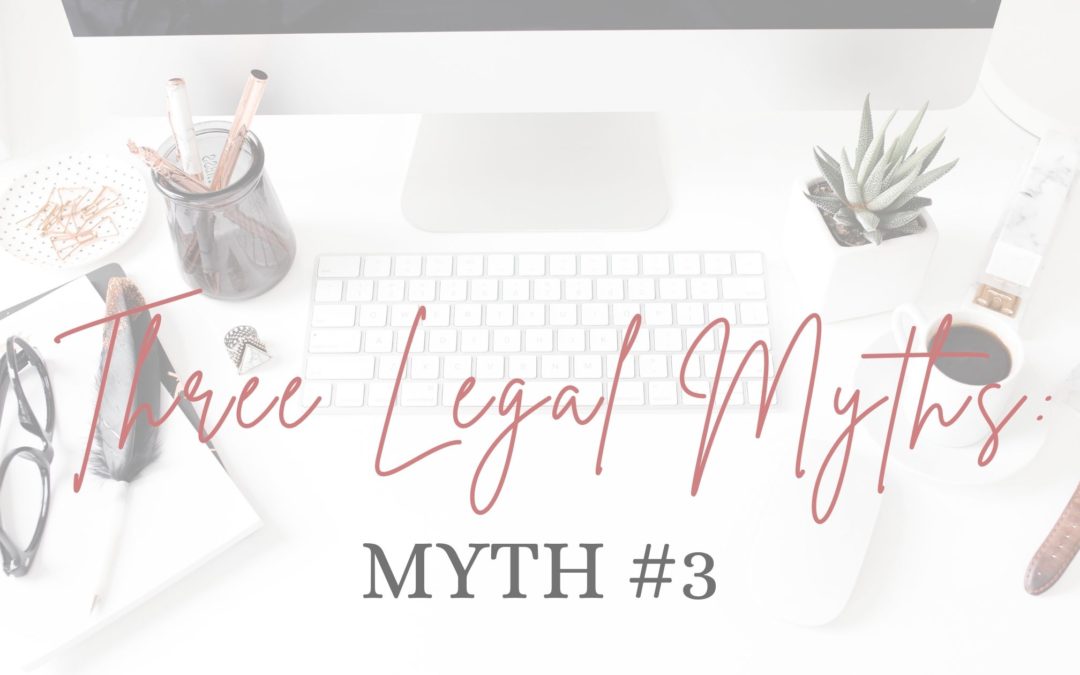Myth #3:
You NEED AN LLC
If you’re just joining us – WELCOME! CLICK HERE for Myth #1, and HERE for Myth #2!
This week is centering on Myth #3 – that you need to be an LLC in order to operate a business.
A few times a week I am asked by someone on social media if they “need” an LLC before they can start their business or purchase my templates, because so and so on Facebook told them they needed to have one in order to legally operate as a business, or they looked at a competitor’s legal documents and saw that they were an LLC. Typically this comes from well-meaning business owners whose accountant told them they should register as an LLC, or after reading something online that addresses why LLCs can be smart decisions. However, the business entity you should choose is VERY dependent on a few key things:
- What state do you live in?
Every state has different rules and regulations for corporations that may or may not favor registering as an LLC, Corporation, or remaining a sole proprietor.
(Quick recap: a sole proprietorship is the simplest way to operate a business. In order to create one, you simply start doing business. You aren’t creating a separate business entity, or separating yourself personally from the business – it is an extension of yourself. If you do wish to create a separate business entity, the most common options are the Limited Liability Company or “LLC”, and the Corporation. To create an LLC or Corporation, you must file certain documents with your secretary of state, have operating agreement and/or corporate bylaws drafted, and pay all associated taxes and fees in order to properly set up the entity. In order to remain an entity in good standing, you must make sure you’re keeping up with all maintenance fees and documentation requirements.)
So when you’re considering which business entity is right for your business, you’ll want to look at your state’s laws regarding each entity, and ask your accountant or CPA about any corresponding tax fees or requirements. For example, in California there is a minimum $800 franchise tax fee, meaning, the minimum you will pay annually in taxes is $800, even if you don’t make any money. If that doesn’t make sense for you right now and you’re in CA, it may be best to stay a sole proprietor and increase your insurance, and then create the LLC or Corporation when it makes financial sense.
- How much money do you expect to bring in this year?
This is important for a few reasons. First – as we just discussed, some states have tax minimums that must be paid annually, regardless of how much money your company brought in. If your annual revenue is less than the annual tax requirements to remain a business entity in good standing, it may not make sense to create the business entity at that point. Second – increased revenue and higher tax brackets can mean paying more in self-employment taxes, and when you’re a sole proprietor, you’re paying self-employment taxes on the FULL amount you brought in, rather than a smaller salary, as you likely would as an employee of a business entity. Once your business starts bringing in a solid amount of revenue, this is a great question to ask your CPA or tax professional, to make sure you’re making the smartest choices about tax laws in your state.
- What type of goods/services are you offering, and how does that translate into risk?
The primary difference between a sole proprietor and LLC/Corporation is the amount of personal liability or risk you want to take on in your business. In a sole proprietorship, the business is considered an extension of yourself personally – there’s no separation between you as an individual, and you as a business. The potential downside of this is that, should your business be sued, all your business AND personal assets could be on the hook to satisfy any judgment against your business. While this does sound scary, and sound like something you should avoid, it’s not necessarily always a bad thing, depending on the type of business you have, and the risk associated with doing business in that field. If you are operating some kind of coaching business offering 1:1 coaching services, you have a solid client agreement that limits your liability, and you carefully explain any risks or disclaimers to your clients, it may be that from a practical standpoint, you may not run into any big issues. Additionally, if you have professional liability insurance that covers your sole proprietorship, any claims or lawsuits may be handled by them. So even though the term “personal liability” sounds scary, when you look at it in a more detailed and practical way, it may end up being a great option for a new business.
However, let’s say you operate a health coaching business, and are also a licensed counselor or registered nurse. You’re offering lab testing and information based on the results of the lab tests, and providing in-depth health and wellness coaching, as well as online courses and group coaching to individuals with health concerns, or who may be struggling with certain areas of their health. Perhaps you have a big social media following, and are expecting a big financial return on your course launch or individual coaching offerings. In that example, while I would also recommend liability insurance, and VERY clear disclaimers in your attorney-drafted client agreements, it may make more sense to create an LLC or Corporation from the beginning (or near beginning) to establish boundaries in the liability department, and to very clearly separate your coaching business from your professional business. Additionally, if there are health and wellness issues in play, the services and potential issues may end up being a bit riskier than other types of life or business coaching.
Wherever you are in your business, it’s ALWAYS a good idea to consult with an attorney and accountant regarding your personal situation, to make sure you are setting yourself up for success, from both a financial and legal perspective. While colleagues and acquaintances on social media mean well, and may be offering advice or insight they learned from their attorney or accountant, it doesn’t necessarily mean it will apply to you, and doesn’t mean it is correct information.
Have more legal questions, or want more on this topic?? Grab my 50+ page E-book HERE, that outlines ALL the basics on how to legally operate an online business!
Grab my FREE Legal Checklist to see if Your Business is Legally Compliant!



Thank you, Christy. I have been struggling with this exact issue and feel paralyzed! I am sole proprietor with a psychotherapy practice. I am currently a 1099 contractor in a group practice and will be moving into my solo practice. I will transition within the next 1-2 months. I am also a recently certified life coach and plan on starting a coaching business in about 4-6 months. My question is since I will eventually have 2 businesses and need to keep them separate in a very clear way, should I start my therapy LLC now or wait until I’m ready to do my coaching business? I’m in Hawaii. Thank you so much!!
Hello Christine! Congratulations on your new businesses! I need a bit more info in order to give insight. Please email me at christy@christywesterfeld.com!